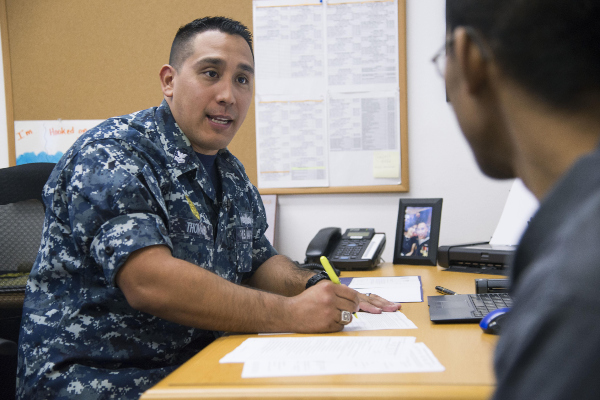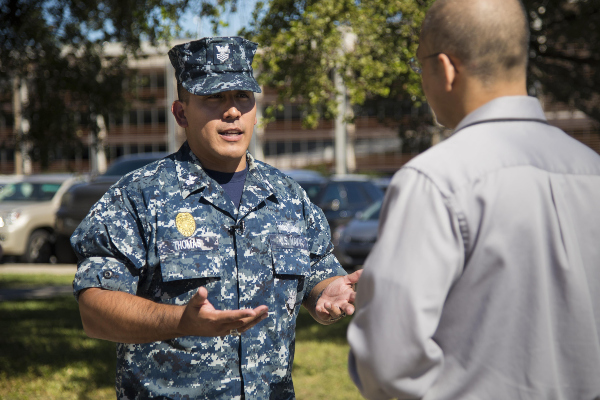The United States Navy acts as the naval warfare service branch.
It is one of the six uniformed services in the United States, and the largest navy in the world based on personnel and fleet capabilities.
Joining the U.S. Navy is a critical decision that everyone considering the Armed Forces should keep in mind.
The Navy has many benefits including being one of the top branches for touring the world.
One of the first steps in the enlistment process is meeting with a Navy recruiter.
Navy recruiting offices are scattered across the country as well as available online via live chat.
The guide is intended to provide you with helpful advice and insights as you prepare for visiting a Navy recruiter near you.
Jump To A Section
Step 1: Make Sure You’re Eligible
Step 2: Finding a Navy Recruiter
Step 3: Prepping for Your Visit
Step 4: What To Do AFTER You Meet With A Recruiter
Summary
Step 1: Make Sure You’re Eligible

The Navy is the second largest active duty service branch in the U.S. Armed Forces.
It is only behind the Army, with nearly 344,000 active-duty personnel.
Additionally, the U.S. Navy supports another 58,000 in the Ready Reserve.
The good news is that the Navy wants an additional 37,700 new recruits for 2023, thus improving your chances of gaining approval.
This aggressive goal is inviting to new recruits but you need to make sure you qualify first for service.
The U.S. Navy requires that you meet basic requirements and stipulations before you enlist.
For starters, you need to:
- Be between the ages of 17-39.
- A citizen of the United States or resident alien.
- Attain a high school diploma or GED equivalent.
The U.S. Armed Forces require new recruits to complete the Armed Services Vocational Aptitude Battery (ASVAB).
The series of tests help you find a Navy rating (or military job) based on your strengths and weaknesses.
Both the overall score on the ASVAB as well as individual line scores enable you to qualify for certain Navy ratings.
A Navy recruiter can provide more information on ASVAB testing dates and preparation for the critical exam.
Related Article – How To Get Into The US Naval Academy: 5 Challenging Steps
Additional Requirements
New recruits for every military branch need to pass a Military Entrance Processing Station medical exam.
The medical screening is conducted by a physician that works for the government, who verifies that you are physically and mentally fit for service.
Moreover, the Navy has height and weight standards along with physical fitness requirements.
Finally, the Navy has additional requirements for recruits that seek to enter service as commissioned officers.
Most officer specialties require the completion of the Aviation Selection Test Battery (ASTB) and Officer Aptitude Rating (OAR).
You can learn more about the additional guidelines needed to become a commissioned officer by speaking to a Navy recruiter.
Related Article – Pros and Cons Of Joining The Navy
Step 2: Finding a Navy Recruiter

The U.S. Navy has designated recruiters like other military branches.
The purpose of a recruiting office is to provide a place where people that are interested in joining the military can go learn more about a particular branch of service.
There are countless Navy recruiting offices spread out throughout the country.
You can search for a “Navy recruiting office near me” or “Navy recruiting in _____” on Google.
Or you can use the helpful recruiting office locator on the official Navy website.
Additionally, high schools and colleges regularly host recruiters from the U.S. Armed Forces.
You can speak to a counselor to find out the next time a Navy recruiter will be in the area.
Finally, the official Navy website has a live chat option along with a way to request more information via standard mail.
Step 3: Prepping for Your Visit

Once you locate a Navy recruiting office near you, it’s time to schedule a meeting.
It’s natural to feel nervous going into a visit with a Navy recruiter.
However, you shouldn’t worry or stress over the experience as it’s an outstanding time to ask a military official all the questions you have about the process.
A military recruiter can offer you more information on the Navy, types of military jobs, enlistment process, and opportunities for promotion or special pay.
It’s important to treat the visit with a Navy recruiter like a job interview.
The recruiter will ask you a list of questions to help gauge your interest and eligibility.
On the other hand, you can ask the recruiter any questions or concerns you have about serving the country.
Like a job interview, you should arrive at the appointment with appropriate clothing and a good attitude.
The military takes personal appearance and conduct very seriously, which makes creating a good first impression very important.
If you are stuck finding some good questions to ask a military recruiter, consider these 41 questions.
While most recruiting offices allow walk-in meetings, it’s best to schedule an appointment.
If you have urgent questions that you would like answers to immediately, consider reaching out via the live chat.
Related Article – Is Navy Boot Camp Hard?
Step 4: What To Do AFTER You Meet With A Recruiter

You should feel a lot better after you leave an appointment with a Navy recruiter.
If you still feel on edge or nervous, it might be a telltale sign that serving the Navy is not right for you, and that’s perfectly fine.
Regardless of your thoughts and feelings, you should never sign up for any long-term commitment before you have time to think it over.
Furthermore, you should reach out to family and friends to get their opinion on the matter.
More than likely you’ll meet some resistance, as not every family member or friend is happy to see a loved one leave to serve the country, particularly in a dangerous location.
However, at the end of the day, the choice is up to you. But you should consider what people you trust have to say about the matter.
Secondly, you may select a Delayed Entry Program that could take weeks or months until boot camp.
In the meantime, you can get into shape by working out daily and preparing for a grueling military lifestyle.
Thirdly, you’ll want to perform the best you can on the Armed Services Vocational Aptitude Battery (ASVAB).
Prospective sailors need to do their research and due diligence to confirm they are making the right decision about the Navy.
Recruiters are employed by the U.S. Navy to sell the benefits of military service and improve enlistment numbers.
Anything that is promised to you in a final enlistment contract (i.e. pay bonuses) should be confirmed in writing.
Never assume or take a recruiter at their word if you are expecting certain guarantees in your contract.
Additional Resources
A military recruiter can provide you with test-taking tips and practical advice.
Performing well on the ASVAB opens more doors for you, as you have the opportunity to select from a variety of Navy ratings.
The Navy partners with the Khan Academy as a free resource for new recruits.
It offers practice exercises and lessons to help up your ASVAB test score.
The Navy also offers a Physical Fitness Assessment (PFA) app to prepare your body for the military.
Related Article – Navy Grooming Standards: Hair, Mustache, and Nail Regulations
Conclusion
Finding a Navy recruiter near you is an important first step in the enlistment process.
Navy recruiting offices feature more information on joining the military branch as well as requirements to enlist.
It’s also an amazing opportunity to ask as many questions you have about serving the military.
You’re welcomed to bring a family member or friend to help you think of questions and get a second opinion.
It’s common to have questions about everything involved with the military.
Navy recruiters are available throughout the United States at designated offices, online via live chat, and by phone.
- Navy Promotion Timeline for Enlisted & Officers - June 19, 2024
- Navy SEAL Training (BUD/S) - June 19, 2024
- Navy Aircraft Carrier Flight Deck Shirt Colors Explained - June 19, 2024
Originally posted on May 27, 2020 @ 7:36 pm
Affiliate Disclosure: This post may contain affiliate links. If you click and purchase, I may receive a small commission at no extra cost to you. I only recommend products I have personally vetted. Learn more.

